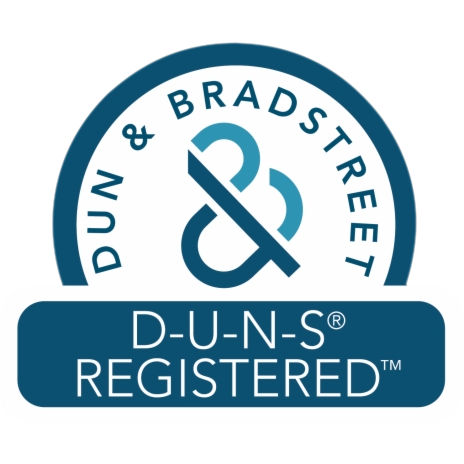Cold Work Steel
now browsing by tag
HCHCR D2 Steel in India for Your Cold Work Steel Industry
When it comes to cold work steel applications, selecting the right material is crucial for durability, precision, and long-term performance. One such outstanding choice is HCHCR D2 Steel—a high-carbon, high-chromium tool steel. In India, Virat Special Steels Pvt. Limited stands out as the leading supplier and stockiest of this versatile steel, catering to industries with a demand for superior-quality materials. This article dives deep into the significance of HCHCR D2 steel, its applications, and why Virat Special Steels should be your trusted partner.
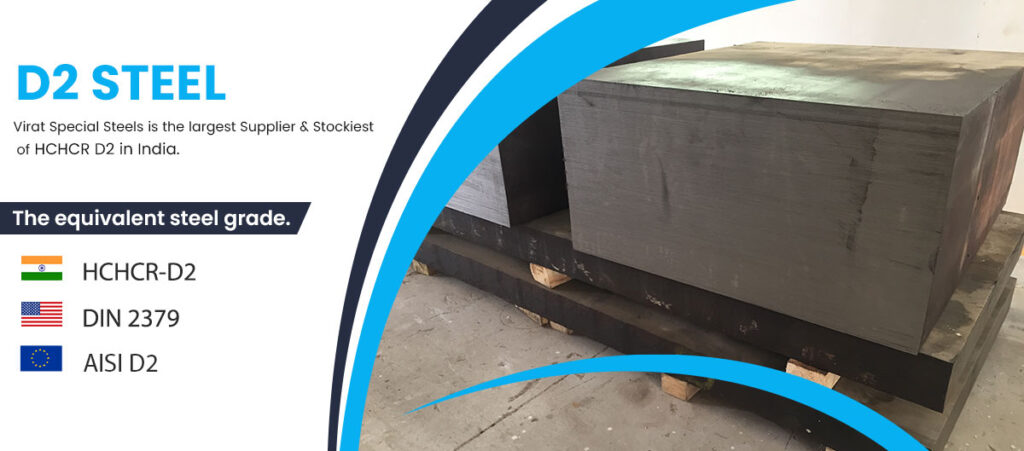
What is HCHCR D2 Steel?
HCHCR D2, also known as DIN 2379 or AISI D2, is a high-carbon, high-chromium tool steel. It is particularly renowned for its exceptional hardness, wear resistance, and ability to retain its sharp edges. These qualities make it the go-to choice for a variety of cold work applications.
Key Characteristics:
- Hardness: Retains sharpness and withstands extreme wear conditions.
- Wear Resistance: Ideal for prolonged usage in abrasive environments.
- Dimensional Stability: Minimal deformation during heat treatment, ensuring precise applications.
- Corrosion Resistance: Its chromium content provides a level of resistance to rust and corrosion.
Applications of HCHCR D2 Steel
HCHCR D2 steel’s properties make it indispensable in industries that require robust materials for cold work processes. Below are the key applications:
- Cold Stamping and Forming Dies
- Used to create high-precision stamping dies for sheet metal processing.
- Cold Forming Rolls
- Essential for shaping metals under high pressure while maintaining dimensional accuracy.
- Chipper Knives
- Preferred for industrial wood chippers, ensuring longevity and precision cutting.
- Punches and Slitters
- Ideal for creating tools that deliver accurate cuts and punches repeatedly.
- Shear Blades
- Used for shearing and trimming metal sheets, offering excellent cutting performance.
- Tire Shredders
- Equipped to handle the rigors of recycling and tire shredding.
- Threading and Cutting Dies
- Provides high-quality threading solutions for industries needing fine details and uniformity.
- Stamping Tools
- Reliable for mass production, ensuring tools can handle repetitive tasks without wear.
Why Choose Virat Special Steels Pvt. Limited?
Virat Special Steels Pvt. Limited has established itself as India’s largest supplier and stockiest of HCHCR D2 steel. Here’s why you should partner with them:
1. Extensive Inventory
Virat Special Steels boasts a wide range of sizes and configurations to cater to varying industrial needs.
- Round Bars: 13mm Dia to 1500mm Dia
- Rectangular Bars: Thickness 13mm – 500mm, Width 13mm – 1500mm
2. Industry Expertise
With years of experience in the steel industry, the team at Virat Special Steels offers unmatched knowledge and guidance. Their technical expertise ensures you get the perfect material for your requirements.
3. Top-Quality Products
The company sources only the best-quality HCHCR D2 steel, ensuring products meet stringent international standards. Their steel is known for its:
- Superior machinability
- Excellent wear resistance
- Outstanding surface finish post-treatment
4. Customer-Centric Approach
At Virat Special Steels, customer satisfaction is paramount. From consultation to delivery, their dedicated team provides seamless service to meet your timelines and specifications.
5. Competitive Pricing
Despite being a leader in quality and service, the company offers competitive pricing, ensuring value for money.
Modes of Supply for HCHCR D2 Steel
Virat Special Steels ensures you have access to the best materials for your specific application. Their HCHCR D2 steel is available in a variety of formats, including forged and rolled bars.
Available Options:
- Rounds and rectangular configurations
- Custom sizes for niche applications
- Bulk quantities for industrial operations
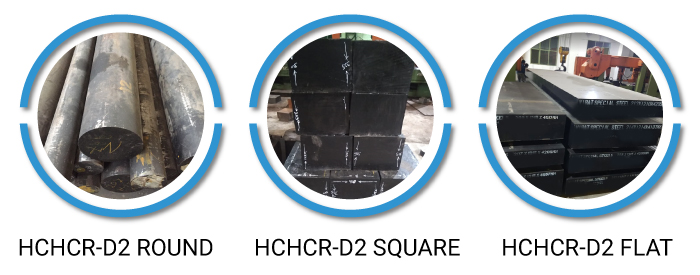
Benefits of Using HCHCR D2 Steel from Virat Special Steels
1. Durability in Harsh Conditions
HCHCR D2 steel offers unmatched toughness and is designed to handle the demands of cold work applications.
2. Enhanced Productivity
With its exceptional resistance to wear and deformation, industries can achieve higher efficiency and reduced downtime.
3. Cost-Effective Solution
Investing in high-quality HCHCR D2 steel translates to long-term savings due to its extended lifespan and reduced maintenance needs.
4. Eco-Friendly
Virat Special Steels is committed to sustainable practices, ensuring environmentally responsible sourcing and processing.
How to Place Your Order with Virat Special Steels
Ready to enhance your operations with the best HCHCR D2 steel in India? Here’s how you can get started:
- Consultation: Connect with their expert team to discuss your specific needs.
- Sizing: Select from their extensive range of sizes or request custom dimensions.
- Quotation: Receive a competitive price quote tailored to your order.
- Delivery: Experience fast, reliable shipping across India.
For more details, visit their dedicated HCHCR D2 page: Virat Special Steels HCHCR D2.
Conclusion
When it comes to cold work steel applications, HCHCR D2 steel is the top choice for industries seeking quality and durability. As India’s largest supplier and stockiest of this versatile material, Virat Special Steels Pvt. Limited ensures you get the best in terms of performance and value. From an extensive inventory to superior customer service, Virat Special Steels is the trusted partner you need to take your operations to the next level.
FAQs
1. What makes HCHCR D2 steel unique?
HCHCR D2 steel is unique due to its high carbon and chromium content, providing excellent hardness, wear resistance, and dimensional stability.
2. Which industries benefit the most from HCHCR D2 steel?
Industries like automotive, manufacturing, recycling, and sheet metal processing benefit significantly from HCHCR D2 steel.
3. Can Virat Special Steels provide custom sizes?
Yes, Virat Special Steels offers customized sizes and configurations to meet specific industrial requirements.
4. Is HCHCR D2 steel suitable for extreme conditions?
Absolutely! HCHCR D2 steel is designed to perform exceptionally well in harsh, abrasive environments.
5. How can I contact Virat Special Steels?
You can visit their website here or reach out to their expert team for assistance.
Any further queries feel free to contact us :
🌐https://www.viratsteels.com 📬 info@viratsteels.com ☎+91 98140-21775
D2 vs D3 Steel: Key Differences
When it comes to tool steels, D2 and D3 are two of the most commonly used grades in the industry. Both are high-carbon, high-chromium steels known for their durability and wear resistance, making them ideal for various cutting, shaping, and forming applications. However, despite their similarities, there are distinct differences that can significantly impact their performance in different environments.
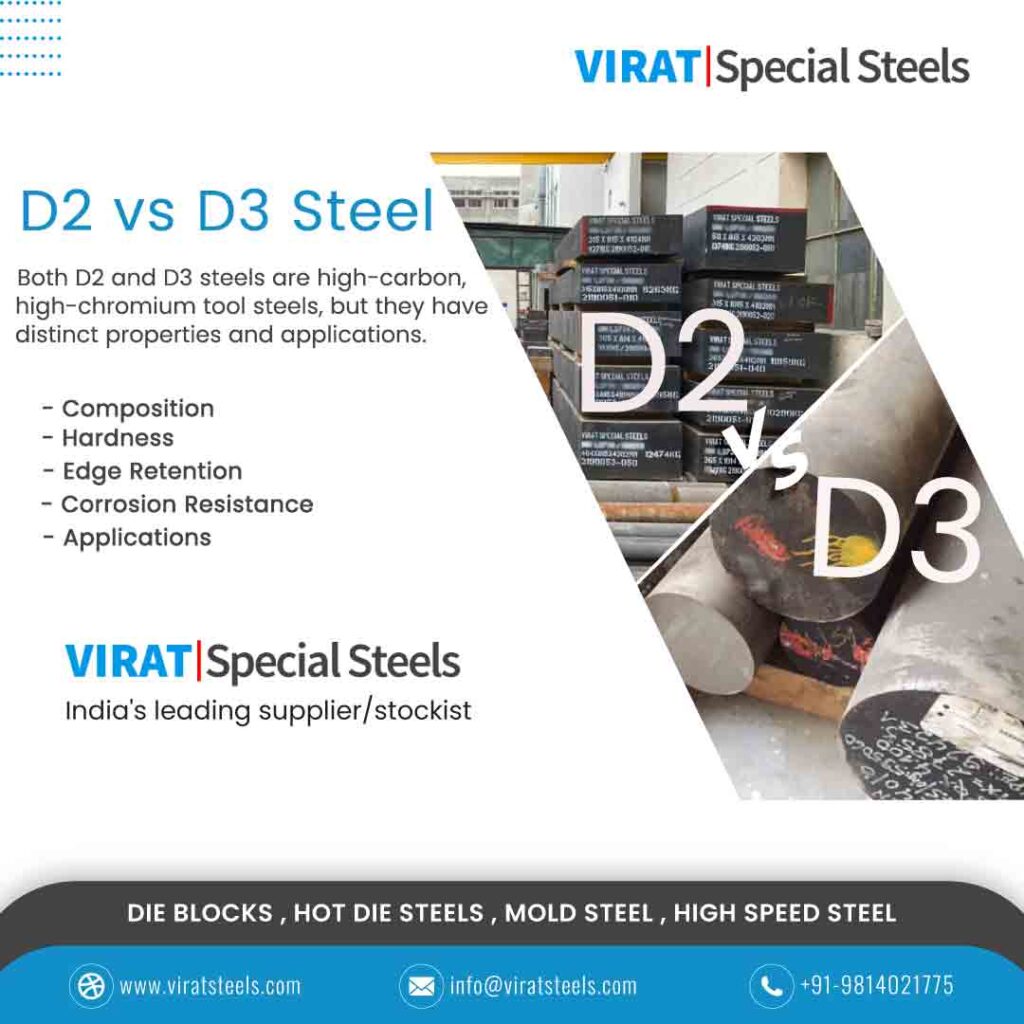
D2 steel is renowned for its high wear resistance and ability to retain a sharp edge, which is attributed to its 1.5-2% carbon and 12-14% chromium content. It also contains small amounts of manganese, molybdenum, silicon, and vanadium, which contribute to its overall toughness and hardenability. D2’s hardness after heat treatment typically reaches 60-62 HRC, providing a good balance between hardness and toughness for many applications.
On the other hand, D3 steel, with its 1.9-2.3% carbon and 12-14% chromium content, offers slightly different properties. It includes small amounts of manganese, molybdenum, silicon, nickel, and copper, which enhance its wear and abrasion resistance. D3 is known to perform better in extreme temperatures and retains its hardness, reaching 63-65 HRC after heat treatment, which is slightly higher than D2.
Edge retention is another critical factor where D2 excels due to its higher carbon content, although D3 can achieve similar levels with proper heat treatment. Corrosion resistance is a shared strength between the two, thanks to their high chromium content, but D3 edges out slightly due to its higher nickel content, offering enhanced corrosion resistance.
In terms of machinability, D3 is considered to have better machinability compared to D2, which can be more challenging to machine due to its abrasiveness and hardness. This makes D3 a more suitable option for applications that require extensive machining.
Ultimately, the choice between D2 and D3 steel will depend on the specific requirements of the project. Factors such as the desired balance between hardness and toughness, wear resistance needs, and machining considerations will play a crucial role in determining the most suitable steel grade. Consulting with metallurgical experts and considering the application’s unique demands will ensure the selection of the right steel for optimal performance and longevity.
For those interested in a more in-depth comparison, further information can be found in detailed analyses provided by industry experts. Understanding these key differences will aid professionals in making informed decisions that align with their project’s goals and budget constraints. Whether it’s for cutting tools, punches, dies, or other demanding applications, choosing the right steel is essential for achieving the desired outcomes in metalworking projects.
Virat Special Steels is the largest stockiest and supplier of HCHCR D2 and HCHCR D3 Steel in flat, square and round bar. We provide steel in all sizes as your requirements. HCHCR D2 and HCHCR D3 die steel is available in flat, square and round shape. Consult our team who will assist you for HCHCR D2/D3 steel query.
Any further queries feel free to contact us :
🌐https://www.viratsteels.com 📩info@viratsteels.com 📲+91-98140-21775
Exploring the Prime Tool and Die Steel Supplier in India!
Tool and die steels are a group of high-carbon steels used primarily in the manufacturing of tools and dies used in metal forming and metal cutting processes. These steels are designed to have high hardness, wear resistance, and toughness, making them suitable for withstanding the severe conditions encountered during the shaping and cutting of metals.
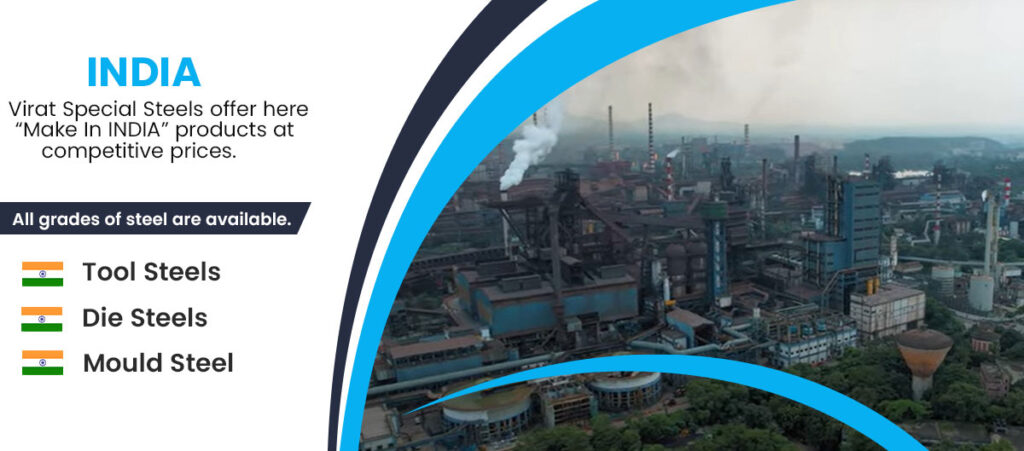
Key characteristics of tool and die steels include:
- Hardness: Tool and die steels are heat-treated to achieve high hardness, enabling them to resist wear and abrasion.
- Toughness: Despite their hardness, these steels also exhibit toughness, which is crucial for withstanding the impact and shock loads associated with metalworking processes.
- Wear Resistance: Tool and die steels should have excellent wear resistance to maintain their cutting and shaping abilities over an extended period.
- Heat Resistance: Some applications may involve elevated temperatures, so heat resistance is another important property for tool and die steels.
In terms of the future of tool and die steel industry in India, it is dependent on various factors, including the growth of the manufacturing sector, advancements in technology, and the overall economic development of the country.
Here are some potential trends and considerations, as India continues to develop its manufacturing sector, there will likely be an increased demand for tool and die steels to support the production of various goods. Innovations in manufacturing processes and technologies may lead to the development of new and more specialized tool and die steels with enhanced properties, contributing to increased efficiency and precision in metalworking.
The competitiveness of the Indian tool and die steel industry will be influenced by global market trends and competition. Adapting to international standards and quality benchmarks will be essential. Government policies and initiatives that promote the growth of the manufacturing sector, technological innovation, and skill development can positively impact the tool and die steel industry.
One of the best Tool & Die Steel Supplier in India is:
Virat Special Steels Pvt. Limited : This is a company that deals in all kinds of tool steel, die steel, plastic mold steel, high speed steel, and alloy steel. They provide value added services, such as material machining, cut pieces, and tailor-made material. They also offer metallurgical advice and quality assurance. They have a state-of-the-art plant in Gurugram and Ludhiana. They also have a strong distribution network across India.
Virat Special Steels Provides Special Steels in All Major Cities India.
Agra, Alwar,Ambala, Anand, Bhiwadi, Dehradun, Ghaziabad, Haridwar, Rudrapur, Delhi, Faridabad, Kanpur, Noida, Gurgaon, Manesar, Kundali , Chandigarh, Waluj , Vadodara, Pimpri – Chinchwad, Rajkot, Jaipur, Ahmedabad, Pithampur, Surat, Amravati, Vadodara, Indore, Bhopal, Ranchi, Jamshedpur, Howrah, Kolkata, Pune, Thane, Nashik, Mumbai, Navi Mumbai, Nagpur, Ambattur, Bangalore, Belgaum, Chittoor, Dindigul, Hyderabad, Ernakulam, Chennai, Secunderabad, Visakhapatnam, Coimbatore, Mysore, Nellore, Kochi, Thiruvananthapuram, Trivandrum, Vijayawada, Guntur, Tirupati, Nazarathpet, Kakinada, Kurnool and many more..
You can visit their website: https://www.viratsteels.com/
Are you looking for HCHCR-D2 and HCHCR-D3 steel in India !
Excellent toughness and high hardness at elevated temperatures. HCHCR-D2 and HCHCR-D3 are commonly used tool steel grades in the Indian steel industry. These grades are similar to the international standards AISI D2 and AISI D3, respectively.
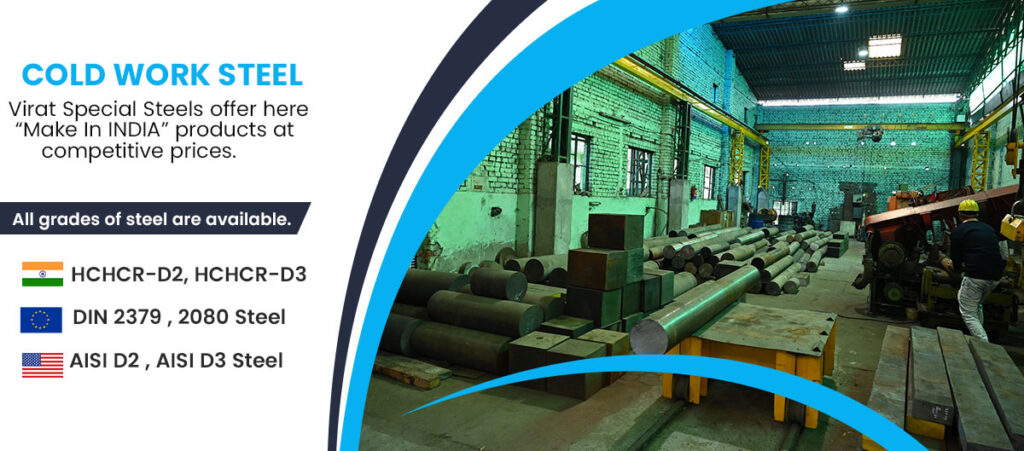
HCHCR-D2 (or AISI D2) is a high-carbon, high-chromium tool steel. It contains approximately 1.5% carbon, 12% chromium, 0.8% molybdenum, 1% vanadium, and smaller amounts of other alloying elements. This composition contributes to its excellent wear resistance, high hardness, and good dimensional stability. HCHCR-D2 steel is known for its ability to retain its hardness and cutting performance even under high temperatures.
HCHCR-D3 (or AISI D3) is a high-carbon, high-chromium tool steel with added cobalt. It typically contains around 2.0% carbon, 12% chromium, 0.2% molybdenum, 0.5% vanadium, 1% cobalt, and smaller amounts of other elements. This composition gives HCHCR-D3 steel good hardness, wear resistance, and dimensional stability. It is particularly suitable for applications that require high wear resistance, such as blanking and forming dies.
Both HCHCR-D2 and HCHCR-D3 steels are primarily used in cold work applications. They are commonly employed in the manufacturing of various cutting tools, such as punches, dies, slitters, and forming tools. These steels offer excellent strength, toughness, and wear resistance, allowing them to withstand the mechanical stresses encountered in cold work operations.
Heat treatment processes, such as quenching and tempering, are typically applied to HCHCR-D2 and HCHCR-D3 steels to achieve the desired hardness and toughness. These processes enhance the steel’s properties and ensure optimum performance in their respective applications.
In summary, HCHCR-D2 and HCHCR-D3 are popular tool steel grades in India, similar to the international standards AISI D2 and AISI D3. They are utilized in cold work applications, offering high hardness, wear resistance, and dimensional stability, making them suitable for various cutting tools and forming dies.
Virat Special Steels is largest stockiest and supplier of HCHCR-D2 and HCHCR-D3 tool steel in flat, square and round bar. We provide steel in all sizes as your requirements. Consult our team who will assist you for HCHCR-D2 and HCHCR-D3 steel query.
Contact us today to learn more about our products and services!
🌐https://www.viratsteels.com/📬info@viratsteels.com ☎+91 98140-21775






